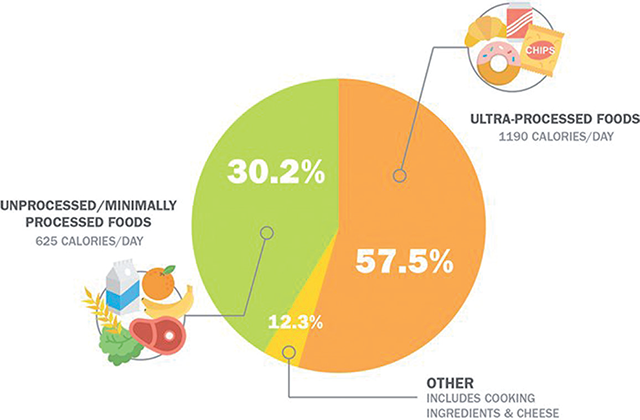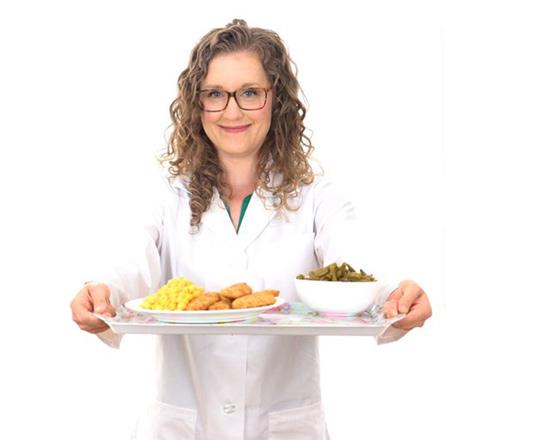You are here
Ultra-processed foods lead to higher calorie consumption and weight gain
By Reuters - May 22,2019 - Last updated at May 22,2019

Photo courtesy of noted.co.nz
People who eat a lot of ultra-processed foods — such as frozen entrees, white bread and canned side dishes — tend to consume more calories than those who eat foods that are not processed, a new study suggests.
Government researchers found that people ate about 500 calories more when offered meals that contained ultra-processed items, according to the results in Cell Metabolism.
“It was a surprise to us,” said the study’s lead author Kevin Hall, a senior investigator at the National Institute of Diabetes and Digestive and Kidney Diseases in Bethesda, Maryland. “Despite our matching meals for salt, sugar and fat — the nutrients people think cause weight gain — we still saw substantial increases in consumption with ultra-processed foods.”
The results underscore the futility of cutting out specific nutrients to lose weight, Hall said. “This study suggests that there could be major benefits from reducing ultra-processed foods and not focusing on specific nutrients or calories,” he added.
Hall and his colleagues rounded up 20 volunteers who were willing to live in the lab for 28 days and consume only the foods that were offered to them.
Each participant was randomly assigned to get either meals containing ultra-processed foods for two weeks or meals with only unprocessed foods. At the end of two weeks, the participants switched to the other group’s diet.
Included in the ultra-processed food category were items such as canned ravioli, canned peaches in heavy syrup, turkey sausages, frozen macaroni and cheese, frozen fried chicken. In the unprocessed category were fresh fruits, homemade hash brown potatoes, scrambled fresh eggs, grilled chicken breast, frozen but unprocessed vegetables.
Meals were designed such that they contained the same amount of nutrients and calories, whether they were ultra-processed or unprocessed.
The researchers calculated how many calories each volunteer should be eating each day to maintain their weight and then doubled that amount for the meals that were offered. Volunteers were told to eat as much as they wanted, and the researchers measured the calories left unconsumed.
The volunteers reported that both diets tasted good and were satisfying, which meant they were not eating less of the unprocessed foods because of taste issues.
One big difference, Hall said, was that levels of an appetite suppressing hormone increased when study participants consumed unprocessed foods “and similarly, ghrelin, a hormone that induces hunger, was lower in those consuming an unprocessed diet, suggesting that this may have suppressed hunger and enabled them to eat fewer calories”.
During the two weeks the volunteers ate ultra-processed food, they consumed an average of 508 more calories per day compared to the amount they ate on unprocessed food days. Moreover, during the two weeks of consuming ultra-processed foods volunteers gained an average of two pounds as compared to a loss of two pounds after two weeks of eating unprocessed food.
While they do not yet know why people ate more and gained weight on a diet rich in ultra-processed foods, the researchers have some theories.
It is possible, Hall said, that the processed foods combine high levels of sweetness and fat in a way that would not occur in nature. “That may stimulate the reward region in our brains,” he said.
Another hypothesis suggests that people ate more ultra-processed food because these items “may be softer and easier to chew and swallow”, Hall said. “We did notice they ate these foods more quickly. When you eat that quickly, it doesn’t give your gut enough time to process that signal.”
This is a “really great study”, said Dr Rekha Kumar, an endocrinologist and an assistant professor of medicine at NewYork-Presbyterian and Weill Cornell Medicine in New York City.
“Even though the obesity epidemic was correlated with the increasing prevalence of processed food consumption, this is the first time we’ve seeing this in a randomised, controlled trial,” Kumar said. “This kind of study is hard to do. I have a feeling that other things, such as blood sugar and liver enzymes, would go the wrong way as well with these ultra-processed foods in a longer-term study.”
Related Articles
PARIS — Ultra-processed foods (UPF) are commonly portrayed as a modern health scourge: A threat lurking on the shelves of every supermarket
People who eat lots of ultra-processed foods are more likely to develop heart disease and to die sooner than those who stick with foods in t
People who consume mostly packaged foods and drinks with lots of unpronounceable ingredients may be more likely to develop certain cancers t














